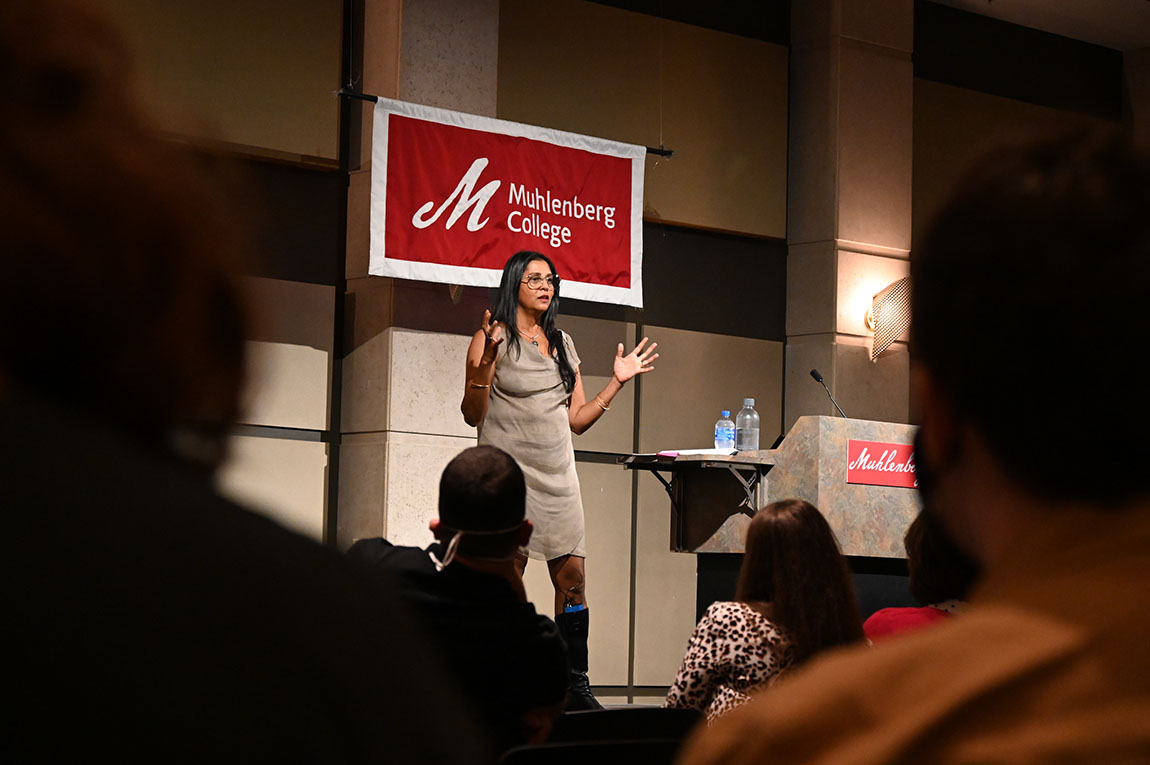Science Journalist Sonia Shah Delivers First In-Person Center for Ethics Lecture Since Start of Pandemic
Her talk, “People and Microbes on the Move in the Era of Climate Change,” was part of the 2021-2022 series.By: Meghan Kita Thursday, September 23, 2021 04:01 PM
 Author and science journalist Sonia Shah. Photo by Tom Amico
Author and science journalist Sonia Shah. Photo by Tom AmicoYesterday evening, dozens of masked students, faculty, staff and members of the local community gathered in Moyer Hall’s Miller Forum to hear the author Sonia Shah speak. Associate Professor and Director of Public Health Chrysan Cronin introduced Shah’s lecture as the first public event she'd attended at the College since March 10, 2020, when a faculty panel on COVID-19 took place in Miller Forum hours before students learned they had to leave campus.
“This is also my first in-person event since the start of the pandemic,” began Shah, a science journalist who has written five books, including 2016’s Pandemic: Tracking Contagions from Cholera to Coronaviruses and Beyond. “I’m here with a lot of gratitude and,” she paused, “a little bit of trepidation.”
Shah visited campus as part of the 2021-2022 Center for Ethics series, which has the theme “Pandemic: Response, Resilience, Reflection.” She opened her talk with an appealing premise: While it’s important to think about how to prepare for the next pandemic, what if we also thought about how to prevent pandemics from happening at all?
This future is possible, she said, because pandemics are not random, freak occurrences. We know what behaviors and conditions make it possible for pathogens that primarily live in animal hosts to infect humans and for those humans to go on to infect others. For example, she said, “humans are invading wildlife habitat on a scale unprecedented in human history.” Also, many people around the world live in crowded, unsanitary conditions that make it easy for pathogens to take hold and mutate. Factory farms replicate those conditions for livestock, putting the people who raise and butcher those animals at risk of catching and spreading a novel disease. Once pathogens find human hosts, “we carry them around on the most efficient travel network we’ve ever had.”
Still, people talk about pandemics as if the pathogens are “invaders” that “jump” from animals to humans, as if they’re crossing a chasm instead of passing through direct contact. “What gets erased in this is our own complicity, our own agency, in creating the conditions that led to these microbes emerging,” Shah said.
After her talk, Shah took questions. The final one was from a student who felt discouraged that our systems were so broken and who asked Shah to provide some hope for the youth in the room. Shah responded that she thought her message was hopeful: We know what causes pandemics, and a lot of the solutions—using fewer resources, preserving wildlife habitats, changing human food systems—will also work toward solving the other major catastrophe of our time, climate change.
“I find this moment, as scary and disruptive as it is, to be full of promise and hope for the future,” Shah concluded.
